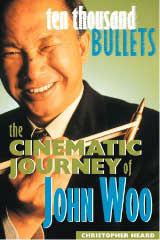

Heard covers these years competently and in a very readable if not imaginative manner. His style is not particularly analytical – much more narrative and chatty in nature – and his very obvious admiration for Woo makes the objectivity of the book a bit suspect. This is not “a warts and all” biography – but it is also not simply a fanboy quickie knockoff to cash in on Woo’s popularity. There has been a fair amount of research done and interviews with some key figures in Woo’s life as well as Woo himself.
Though I would have appreciated more analytical insight into Woo’s films – Heard blows off this sort of thing as pretentious – there are still a number of facts and stories that I found quite interesting. For example, he tells of Woo’s original beginning for The Killer as described by Woo “The original opening was in a jazz bar. The killer and the singer are there. She’s blind and they are already in love. The singer was performing a jazz song and the killer was playing the saxophone. There were lots of flashbacks to show how he wounded the girl and fell in love with her”. Thankfully, Tsui Hark the producer convinced Woo otherwise!
Another strength of the book is that Heard attempts to put Woo’s life into some context in terms of what was happening in the HK film scene and he also takes time to give some biographical details on the actors who appear in Woo’s films.
Though understandable from perhaps Heard’s perspective, my major gripe with the book is that it seems tilted to coverage of Woo’s Hollywood productions. Woo’s life up to A Better Tomorrow is covered in 39 pages, his fertile HK period (1986-1992) is covered in 60 pages and then his Hollywood career is covered in 90 pages. This is partly due to Heard having much more access to a number of people who worked with Woo in Hollywood and Heard being able to observe Woo in the filmmaking process. Still, when you spend more time talking about his TV movies – Once a Thief and Blackjack – than most of his HK films, it is slightly ridiculous.
For the most part though, I think that for
people that wish to learn more about Woo – his influences, his background,
his films – this is a handy and easy to digest place to start.